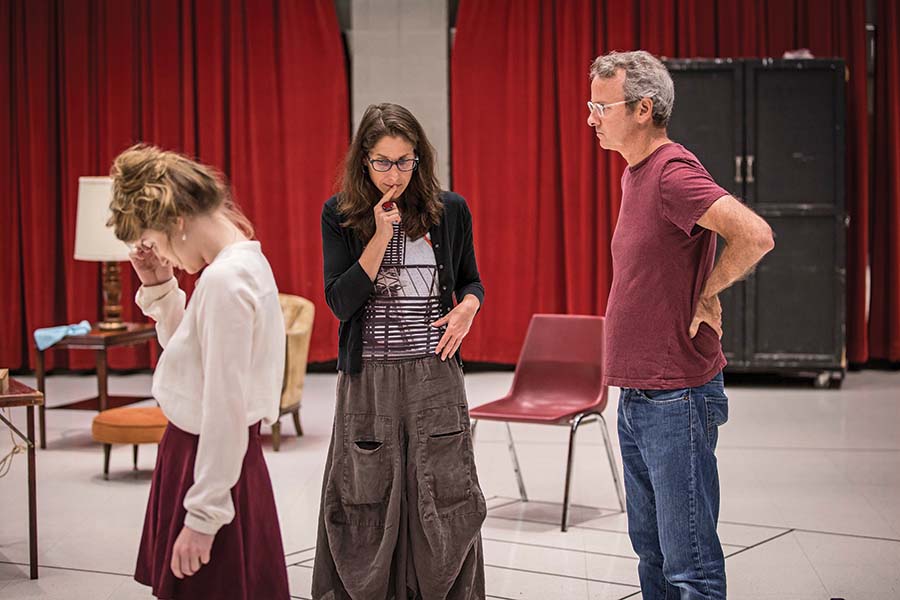May Adrales began pursuing a career as a director when she was fired from a political think tank. In fact, her theatre work may have cost her the day job: She was writing and directing a play for the New York Fringe Festival, and the think tank wasn’t happy with the number of production-related calls she’d made on the office phone, or the number of scripts she’d run through the copy machine, or props from the show (baby dolls, whips, five-inch heels) she stored in her cubicle. When the organization threw a going-away party for her, the staff was told the reason she was leaving: to become a theatre director.
“It was the first time anyone had ever introduced me as a theatre director,” Adrales recalls with a laugh. She felt that the universe was telling her to “walk where she was walking.” It wasn’t just her employer; one critic also pointed the way: “One reviewer very kindly said that where I lacked as a dramatist, I made up triple-fold as a director.” So she dropped her longtime pursuit of the law—and her playwriting hobby—and started moving toward the director’s chair.
Anne Kauffman started her training early, corralling her five siblings in the living room to put on plays when she was just six years old. Her penchant for taking control eventually overpowered her singing and dancing skills, and her undergraduate professor at Stanford University, Michael Hackett, inspired her to lean into her directorial calling. “He was the first person to call me a director, and that felt like an enormous responsibility—and a very enticing one,” she says.
Ed Sylvanus Iskandar, another Stanford grad, developed his voracious appetite for the theatre while at school, garnering enough theatre credits to graduate with a drama degree. His academic attention accordingly switched to the stage. “Why would I go to class? I could be doing a play in a tree somewhere,” he said, chuckling. By junior year, he knew he wanted to apply to graduate school for directing, and ended up at Carnegie Mellon University the following year.
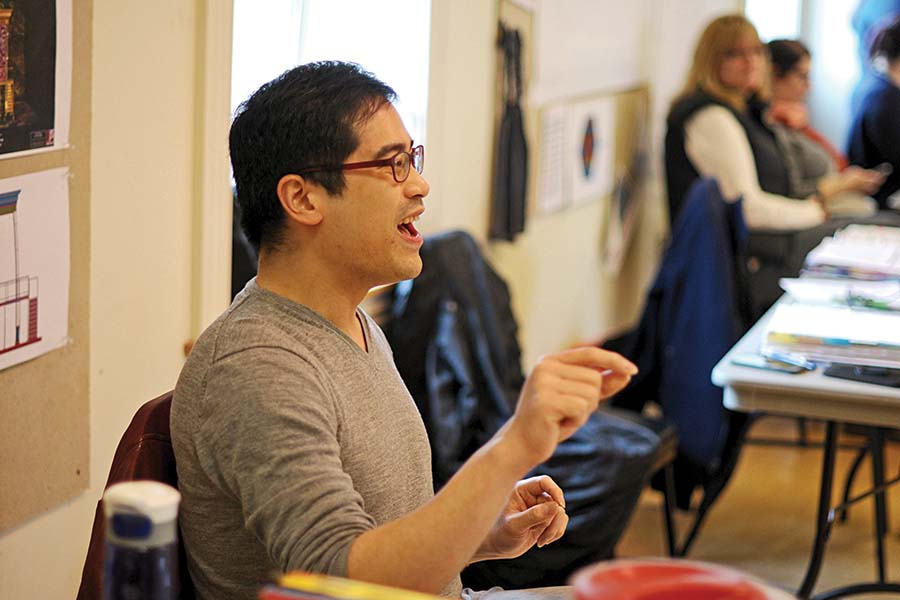
For many, the first step after identifying a hunger for the theatre is to enroll in a training program. After all, it takes more than just an imperious personality to helm a production from rehearsal hall to opening night. Directors do far more than stage plays—they analyze text, conceptualize design, steer emotions, and help audiences navigate the work. There is both an art and a science to directing well. John Langs, artistic director of Seattle’s A.C.T., learned the ropes in the undergraduate directing program at the University of North Carolina School of the Arts. “There is a craft out there that I think is solid and teachable and repeatable—and you can augment for the rest of your life,” says Langs.
Robert O’Hara, who got his MFA in directing from Columbia University, was surprised when the program director, Anne Bogart, said she could teach the class all there was to know about directing in three weeks. What was the rest of the program about, then?
“It really is about what you bring to directing, and what your directorial voice is going to be,” says O’Hara. “What Anne gave us was that we were able to unlock within us each of our own voices, which was very, very exciting and wonderful.” With his directorial voice intact, O’Hara completed two internships and directed numerous plays throughout the rest of the three-year program.
Perhaps the most important skill set a director develops is shaping their career. In this long game of networking and building relationships, training programs—especially those with a certain cachet—come with a built-in support system. “If you can’t direct before you go into a program, most likely you are not going to be able to direct when you get out of the program,” says O’Hara. “If you have nothing of interest to say when you enter the program, you will still have nothing of interest to say when you get out of it. But you may know more people, and that may be enough.”
For O’Hara, the networking opportunities afforded through Columbia were fruitful. As a student he interned with George C. Wolfe and worked with Daniel Sullivan on Shakespeare in the Park productions, and assisted Wolfe on Bring in ’da Noise, Bring in ’da Funk after graduation.
For Kauffman, by contrast, graduate school was all about playtime. “My intentions were not in the making-connections realm—I really wanted to practice my craft,” she says. And after cutting her teeth assistant directing in New York for a few years, she found that the University of California of San Diego provided ample time and resources to hone her skills outside the glare of the industry. “It was like a lab out there, and it felt very protected from New York,” she recalls. The school only accepted two graduate directors each year, and she and Steve Cosson shared the playground under the leadership of Les Waters.
She points to a particular class with Waters that powerfully shaped her thinking about theatre. It was a site-specific class in which they each had to create a solo performance art piece based on a section of Medea. “That was a moment where I understood how to work my point of view into a piece, how to make it personal, how to be unafraid of showing myself in my work, how to explode a moment in a series of images, and also how to get underneath text to excavate its visceral terrain,” she says.
Another influential class was a course on Joint Stock Theatre Company, which Waters had cofounded with Caryl Churchill, and which later inspired Cosson to found the Civilians. “That class was not only helpful,” says Kauffman. “It changed our lives.”
Adrales also went to Yale to learn, not network. “I felt like I’d never studied so many of the classical texts of the theatrical form,” she says. “It was a ripe time for me.” Adrales credits the study of Shakespeare and the Greeks for making her a better director of works by living authors, because “as a new-play director you’re really serving as a dramaturg.” Another takeaway from her time at Yale was leading the Yale Cabaret, a project that planted the seed for her aspirations to someday lead a theatre company.
Likewise, Rachel Rockwell credits the education she received at the University of Evansville as an undergraduate theatre major with sustaining her pivot from a musical theatre performer and choreographer to a director. “I had such an incredibly rich education in all disciplines at the University of Evansville,” she says. “To this day I still think about the quality of productions that I did, the things I learned as an actor, and about the technical elements of the theatre.”
Like Rockwell, Langs started as an acting major. But UNCSA’s dean of the drama school, Gerald Freedman, inspired him to focus on directing. The school’s eight directing students observed Freedman directing professional jobs. One important lesson: Freedman’s rule that directors must make themselves invaluable in every room.
“You have to make that room a brighter place for you being in it,” says Langs. “Sometimes that means you are scraping gum off the floor, or helping a stage manager tape the floor, or making coffee for people.” The students also got experience directing short scenes: “If you can get the nuts and bolts of a 10-minute scene, you can extrapolate out and get to the full play. I believe in that, and I believe we were given the tools.”
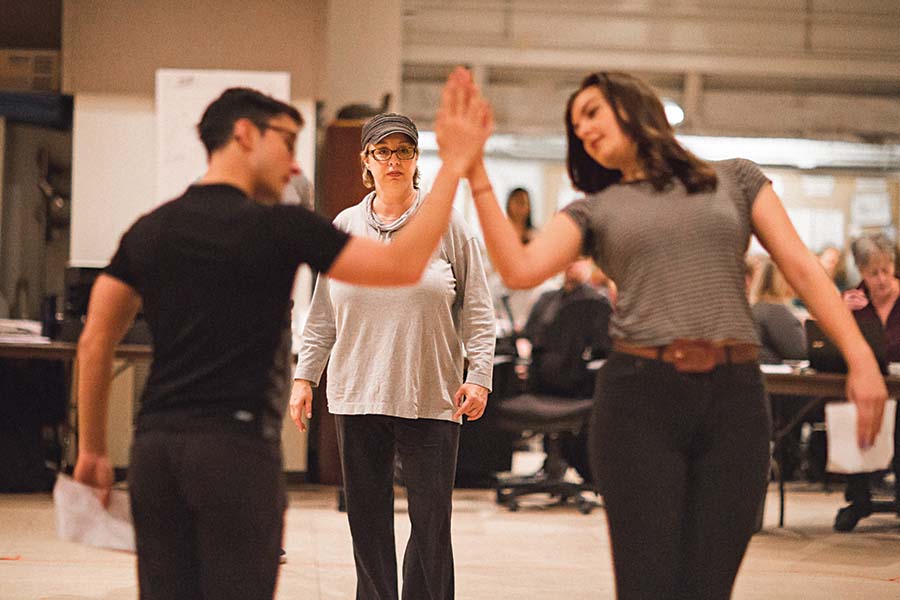
But even with a fully stocked toolkit, there will always be a learning curve when directors enter the industry from any level of training. Directors often enter this new postgraduate territory—“limbo land,” as Kauffman puts it—on tiptoes.
O’Hara was a bit of an anomaly in this regard, though—he jumped right into the deep end. For his senior thesis, he wanted to direct his own play, but because he had never taken a playwriting class, his Columbia mentors discouraged him from pursuing the project. It wasn’t until he missed class to attend a reading of his play Insurrection: Holding History at the Mark Taper Forum in Los Angeles that he got the green light to present it as his final project. Shortly after graduation, his play was produced at the Public Theater.
Still, even with that initial success as an auteur, O’Hara’s trajectory since has proved as challenging over the long haul as for most other directors we spoke to. It’s a common theme: the halting, piecemeal progress of even the brightest directing careers.
“I think that in other disciplines there is a more concrete way of advancement,” says Kauffman. “If someone comes and sees my graduate work and says, ‘That’s a really good production,’ they’re not going to hire me for another five years. They need much more information than just, ‘Oh my God, this is a great text,’ or ‘This is person really nailed this part.’ They need to know how I run a room, and it’s more nervous-making if there is no track record. Ours is the long game, and that is really hard.”
Iskandar points to a related disadvantage for directors.“We don’t have an audition room or a play we can send around,” he says. “The way the industry is inherently shaped is built toward developing and giving opportunities and a platform to playwrights, in a very sincere way,” he says. Iskandar also notes that there is a field-wide fear of engagement with emerging directors until they are “ready.”
For many directors, the projects and creative relationships that form in this post-graduate “limbo land” can inform their entire careers. After graduating, Adrales received a New Generations grant from Theatre Communications Group that led her to working full-time as the head of the artistic programming at the Lark New Play Development Center after school in New York City.
“I did a lot of the casting for the initial development programs,” she recalls. “Even though that felt like I was another cog in the wheel, it was interesting, because I really aggressively cast people of color in lead roles that they had never seen themselves as. I had a lot of conversations with writers about considering and bringing in a more diverse casting pool.” That experience helped Adrales discover her personal core values: “I wanted to be part of the change that I wanted to see onstage.”
Kauffman first got on the map directing Anne Washburn’s The Ladies with the Civilians, which she cofounded with her classmate Cosson, at the Cherry Lane Theatre. Adam Bock, Lisa D’Amour, Amy Herzog, and Jordan Harrison are some of the playwrights who have since helped define Kauffman as a new-play expert.
Iskandar’s niche of developing and directing immersive theatrical works began with his theatre troupe Exit Pursued By a Bear. While assisting directors was helpful, Iskandar wanted more than just the opportunity to observe. EPBB was formed as a way for generative theatre artists to practice their craft on their own time, outside of money jobs. He also attended as much theatre as he could, making note of programs and fellowships listed in the directors’ bios; before long he added the Drama League, the Lincoln Center Global Exchange program, and the New York Theatre Workshop Emerging Artist fellowship to his own résumé.
Iskandar views these residency programs as a sensible next step for young directors to build a pool of potential collaborators. “It is an amazing privilege to be able to do these programs, but in practice it’s a longer road beyond them to finding a way in which you can not only make a name for yourself, but sufficiently so in order to be hired by other people,” he says. The road from his NYTW fellowship to a production at the theatre took nearly a decade. “Is there any industry in the world in which it takes 8 to 9 years to build a relationship that comes to fruition in a significant way?”
Rockwell got her break in time-honored showbiz fashion: She stepped in when someone else dropped out. After graduating from the University of Evansville, she was choreographing a production of the musical Tintypes at Indiana’s New Harmony Theatre when the director left the project, and theatre’s artistic director asked the 22-year-old Rockwell to take over. “It felt like exactly where I was supposed to be, because it was everything that I loved all at once—manipulating movement, being able to speak to the emotional journey, and having ideas about the technical elements.”
For directors, the lessons only continue in the professional realm. On Tintypes, Rockwell learned that it is necessary to leave time and room for failure. “The biggest thing for me to learn was patience—I wasn’t allowing room for discovery, and I think that is a young-director thing.” Another challenge: picking and choosing which projects to take on. “I wish it wasn’t the case that you feel, particularly as a young woman director, that you have to take every project that comes your way—especially as a working mother,” she says.
Other real-world setbacks can be hard teachers. Adrales felt knocked down, for instance, when negative reviews for her first big directing gig at Chicago’s Goodman Theatre rolled in. “Learning how to deal with perceived failures is a lesson I keep learning,” she says. “I feel like that production taught me how to understand and listen to criticism, and to decipher for myself what is useful and what is not.”
The project-to-project hustle of freelance directing can also be demoralizing. As Iskandar puts it, directing can be the loneliest profession in the world. “Our job is essentially to build cultures and communities around us,” he says. His directing jobs around the globe have recently left him “feeling like a tree sprouting multiple branches, but not necessarily deeper roots.” He notes that immersive theatre projects, which necessitate a lot of community-building and collaboration, make departing after opening night especially difficult. While directors spend their time building communities in the rehearsal room and in the audience, it is just as important to build their own community of supportive collaborators.
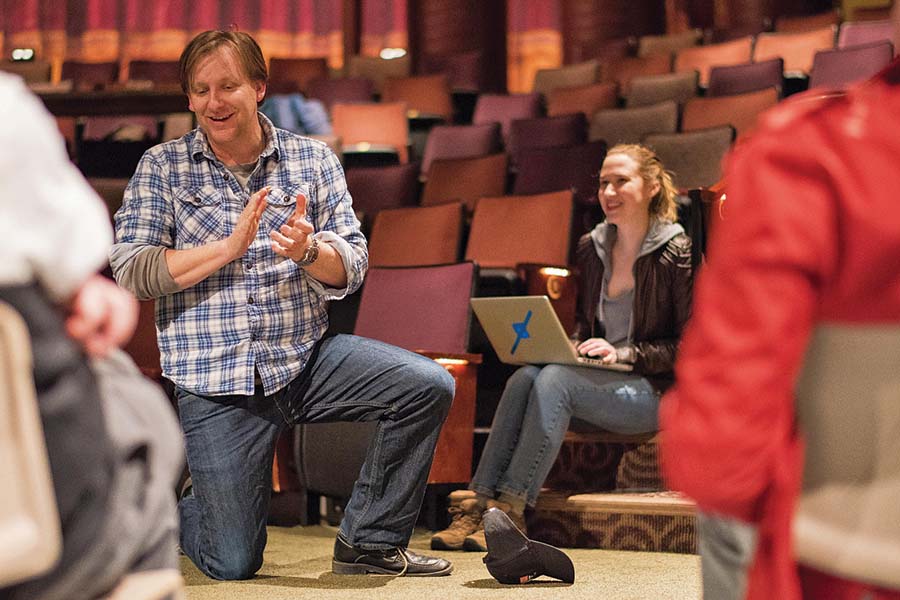
The long game of building a directing career is reflected in microcosm in the long-gestating projects many directors shepherd from start to finish. Langs says that building a show is a marathon, not a sprint, and Kauffman notes that her work on a project begins as soon as she is given a script, sometimes a full year before rehearsals begin.
As Rockwell explains, “If you’re going to create a world, you’ve got to understand all of the elements of the world.” With her work on new musicals, she weighs projects carefully before committing. “Is it something I am going to want to spend several years of my life on? Am I going to be in a room with these authors for four years?” For the dark musical Ride the Cyclone, her answer was a resounding yes. Rockwell has been with the show for more than four years, and the musical’s next stop, after runs in Chicago and New York, is Seattle’s 5th Avenue Theatre.
The travel involved with working in regional theatres has led O’Hara to choose his projects more carefully. “I’m tired of getting up and running across the country to direct,” he admits with a laugh. “I base decisions on the experiences I want to have and the rooms that I want to be in. It is about the people involved, about the community in which I am presenting it in, and the experience which I am going to be allowed to engage with the play.” One of his last projects, an all-male production of Macbeth at the Denver Center for the Performing Arts, was a new learning experience for him. “No one had ever offered me a Shakespeare play, so I jumped at the chance,” he says.
There is also an emotional toll in working in a field steeped in drama. Earlier this season, Kauffman made her Broadway debut directing Scott McPherson’s Marvin’s Room, a play about a woman caring for her bedridden father who learns that she has leukemia, and she recently wrapped up Amy Herzog’s Mary Jane at New York Theatre Workshop, about a single mother struggling to care for a terminally ill toddler. “I’m drawn to these texts, I’m drawn to these really dark places,” she says. “But I am completely able to compartmentalize.” An all-in attraction to extremes is why she loves her job, she says: “This discipline in the theatre demands every part of you to engage with what you’re making.”
O’Hara concurs. “When someone asks me to direct their play, I’m going to bring all of Robert O’Hara into the room. I will bring the playwright, I will bring the director, I will bring the gay guy, the African-American man—I bring all of that into the room to engage in the play and help enhance the experience for the audience.”
Rockwell brings her experience as a performer into the room, and finds it is helpful for understanding the psyche of an actor. “I know exactly how they feel in that moment when I’m cutting their song in the show, and I have to explain why.” Her experience also appears in the physical work in her productions, particularly with actor-driven scenic transitions. “I think without motivation and without appreciation, those can be tortuous to do as an actor,” she says. “When you are given the opportunity to feel like you are making an artistic contribution to the storytelling of the piece, I think it changes your perspective on moving a chair. Now I make it part of the storytelling. It is a device for me, and the best part is seeing people get excited about making a transition artful, beautiful, emotional, and resonant.”
Iskandar, who was born in Indonesia and moved to England as a child to study music, brings “a perspective and a point of view that extends beyond American borders.” His exploration as a director expands each time he directs in a new country, he says, and he’s learned that what makes a good director here doesn’t always translate in other cultures. For example: In England, the text is the action, whereas in America the subtext is the action. When directing Memphis in Japan, he was surprised to learn that the Japanese cast mistook his many directorial questions as signifying his insecurity as a leader.
The link to training is a natural one, as much of what directors bring to the rehearsal room resembles what teachers bring to the classroom. One benefit of a directing MFA is becoming qualified to teach. “Directing is teaching in the way that you channel the room,” says Iskandar, who has taught master classes across the country and at his alma mater, Carnegie Mellon. He says he was stunned to discover how much he loved teaching; one of his favorite courses was exploring what he calls “investigative acting” in opera, which led him to develop an opera at the university with Duncan Sheik and Steven Sater.
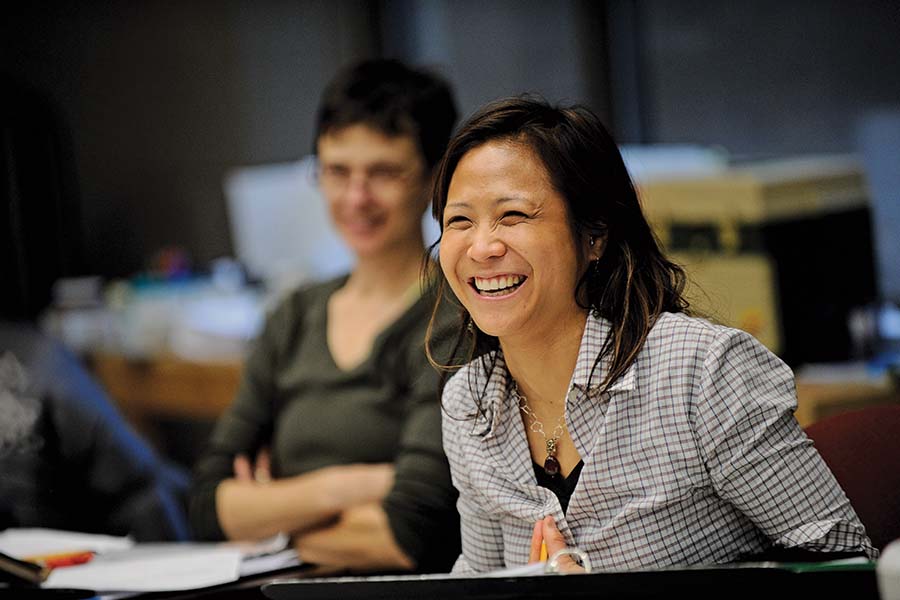
Adrales has returned to Yale to impart to students some of the nitty-gritty lessons of the industry. Her class focuses on discovering who the students are as artists, and leads them through building creative habits. She encourages them to find time to meditate, visit museums, see films: “You have to have a real discipline for yourself and time to develop your own ideas.” She arranges for agents, regional artistic directors, and leaders of companies large and small to speak to the class. She also has the students plan a dream project for post-graduation. She explains: “One of the things I wish I had when I left grad school was a next project.”
She’s taking a teaching break this year, though, as she splits her time between New York City and Milwaukee. She is now an associate artistic director at Milwaukee Repertory Theater, where she works with artistic director Mark Clements. “He knows that I want to cultivate my own leadership skills and run a theatre, so he felt that his responsibility as the leader of a $12-million theatre…is to open the gateway to nurturing future leaders,” she says. “I’m really grateful for that opportunity.”
She’s even finding that her distant dreams of working in social-service law fold into the work of an artistic director. “The most explosive political acts in the arts have been through theatre,” Adrales says. “There is something about the platform of theatre as this live event that actually has created strong resistance to these political issues. Theatre artists really have that opportunity, and so I’m very interested in being part of a larger community and organization that can make an impact in our society in that way.”
For Langs, the transition from freelancer to artistic director is one he’s still working through, even three years after into the role. “The learning curve was straight up the wall,” he says. “I don’t think anything that I was doing in freelance directing prepared me for the kind of administrative and financial work that goes on from this position.” But the draw is the same: Whether you hop from job to job or lead an institution season to season, directing is all about community, and staying in one place rather than jumping among theatres affords him a continued conversation with his community.
Continued learning also comes with the territory of a changing field. “The frenzy of ambition and advancement is totally different from when I first got here,” says Kauffman. “Information is much more available, and people can really see what other people are doing instead of this intense competition that just feels really paralyzing.” She notes another positive: More women are now in the field than when she entered.
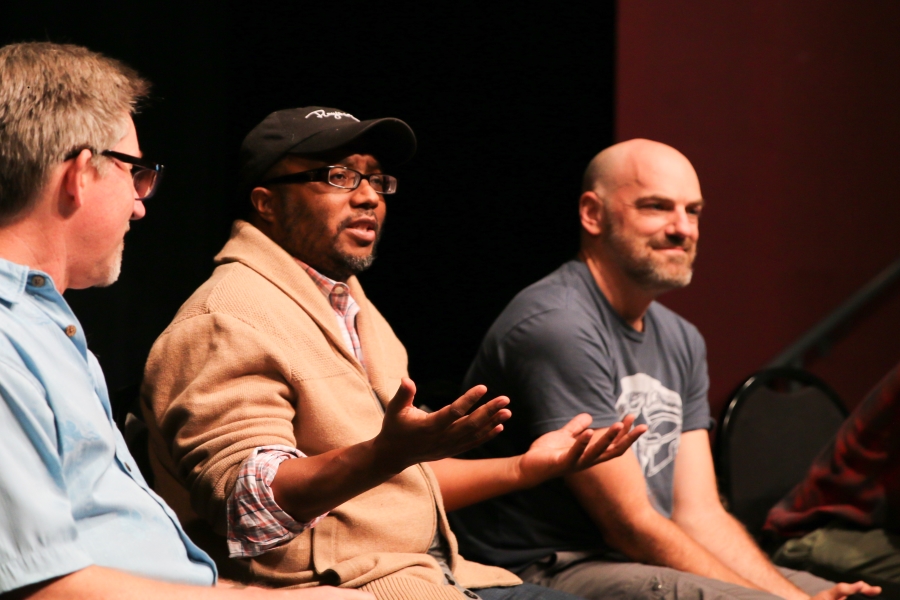
O’Hara, likewise, points out that there are more people of color with directing credits than when he started. “I do think it is better than it was, and I am an example of that,” he says. But one new downside to the job is what he calls the “dog and pony show. When I go into a theatre I’m required to now go speak to the board, or go speak to audience members, or go and have donor lunches,” he says of the added responsibilities of fundraising and audience building.
Clearly the director’s path entails a process of weaving a web of connections and community, whether onstage or in boardrooms. Rockwell says her career has felt “like the ball rolled down the hill, and it kept picking up speed. If I had tried to orchestrate it, I would have undercut myself somehow. I just kind of held on for the ride, honestly.”
And it’s all about the people you find riding on parallel tracks. Says Langs, “If I had anything to say in a valedictorian speech, I’d say: You build a family of artists in this lifetime, so choose carefully and choose well.” Looking back, Iskandar says the wayward process is the best path: “As you grow into your career and into the industry, that is the most beautiful thing about a life in the theatre—even if it felt like you were working in this void.”

